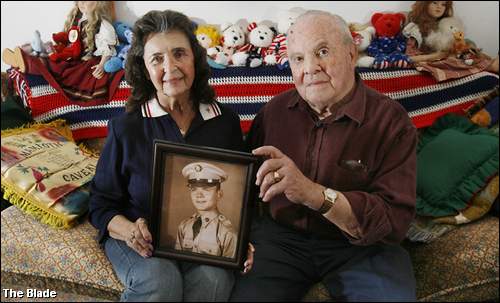Rex E. Wagner
Hancock, Ohio
Born 1933
Corporal, U.S. Army
Service Number 15295516
Missing in Action – Presumed Dead
Died November 2, 1950 in Korea
Corporal Wagner was a member of Company L, 3rd Battalion, 8th Cavalry Regiment, 1st Cavalry Division. He was listed as Missing in Action while fighting the enemy near Unsan, North Korea on November 2, 1950. He was presumed dead on December 31, 1953.
Corporal Wagner was awarded the Purple Heart, the Combat Infantryman’s Badge, the Korean Service Medal, the United Nations Service Medal, the National Defense Service Medal, the Korean Presidential Unit Citation and the Republic of Korea War Service Medal.
10 April 2007:
By: Jennifer Feehan
Courtesy of the Toledo Blade
Marilyn and John Patterson of Findlay hold a photo of Marilyn’s brother, Rex ‘Jack’ Wagner, who enlisted at age 16.
Some 56 years after Rex “Jack” Wagner was declared missing in action in North Korea, Marilyn Patterson of Findlay finally knows what happened to her younger brother.
Using a blood sample from Mrs. Patterson, military investigators were able to identify skeletal remains recovered from a North Korean cornfield as those of her brother.
“It seems like a dream, and I should wake up,” Mrs. Patterson, 74, said yesterday. “It’s been all these years.”
She and other family members had all but given up hope of ever knowing what happened to Mr. Wagner, who was declared missing in action November 2, 1950 — a status that eventually was changed to killed in action.
Don Wagner of Ashland, Ohio, was just 9 when his then-16-year-old brother lied about his age and enlisted in the U.S. Army shortly before the onset of the Korean War.
“It gives us a relief to know what happened and to know he will be brought back to the United States and they will have a decent burial for him,” Mr. Wagner said. “I think that’s good.”
He, Mrs. Patterson, and other family members are making plans to attend Rex Wagner’s funeral and burial at Arlington National Cemetery, which military officials expect to hold in June or July.
For the Wagner family, who lived in McComb, Ohio, at the time of Rex Wagner’s enlistment, it’s been a long time coming.
Don Wagner recalled that his parents searched for surviving members of his brother’s company after the war ended but never found any answers. As he and his sister recently learned, very few members of that company survived the battle that took his brother’s life.
Don Wagner said that when members of the 8th Calvary Regiment, 1st Calvary Division crossed into North Korea, they were overpowered by Chinese troops.
“They had no choice,” Mr. Wagner said. “They basically said run for your life and there was nowhere to go. They just slaughtered them.”
The details of how and where Rex Wagner died are contained in a book compiled by investigators with the Joint POW/MIA Accounting Command (JPAC), whose mission it is to find and identify Americans missing from past U.S. conflicts.
Military officials say Rex Wagner’s remains were discovered in 1998 by a Korean farmer plowing a cornfield. The farmer said he reburied the larger bones at another location, and those were unearthed in 2002 by a military recovery team.
Two years later, Mrs. Patterson was contacted and asked to submit a blood sample for possible DNA identification of the remains.
“When they took my DNA in 2004, I thought then we were going to have closure and there wasn’t,” she said. “I didn’t hear anything, and I thought, ‘Forget it. We’ll never know.’”
Then, last month, she got a telephone call from the Army saying her brother’s remains had been positively identified. On March 28, family members gathered at her Findlay home for a five-hour briefing with Army officials who told them everything they knew and presented a detailed written account of the investigation that included photographs and maps.
Mrs. Patterson’s husband, John, said his wife had put flowers on a white cross that bore her brother’s name at Findlay’s Maple Grove Cemetery for years, then moved the cross to their yard after the veterans’ markers were taken out of the cemetery several years ago.
“She always had him in her heart,” Mr. Patterson said, adding that learning what happened to Rex Wagner was difficult but comforting.
“We always had hopes that maybe he was taken prison over there by the North Koreans and some day he would be released,” he said. “You always have that hope.”
According to JPAC’s Web site, the agency’s Central Identification Laboratory in Hawaii identifies an average of six Americans a month, although most of those investigations take years to complete.
More than 8,100 American servicemen from the Korean War are still unaccounted for, and JPAC is planning three missions to the Republic of Korea this year.
Mr. Wagner said he was impressed by the work that was done to identify his brother and properly lay him to rest.
“They did all this testing. It’s amazing,” he said. “They gave us pictures of where the fighting was, where the battleground was, where they found him… Everything is there right down to the nitty-gritty.”
Michael Robert Patterson was born in Arlington and is the son of a former officer of the US Army. So it was no wonder that sooner or later his interests drew him to American history and especially to American military history. Many of his articles can be found on renowned portals like the New York Times, Washingtonpost or Wikipedia.
Reviewed by: Michael Howard


